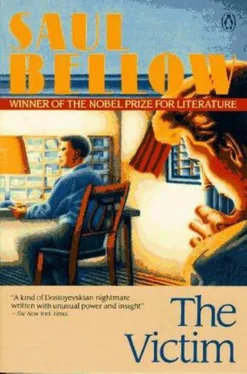Saul Bellow - The Victim
Здесь есть возможность читать онлайн «Saul Bellow - The Victim» весь текст электронной книги совершенно бесплатно (целиком полную версию без сокращений). В некоторых случаях можно слушать аудио, скачать через торрент в формате fb2 и присутствует краткое содержание. Год выпуска: 1988, Издательство: Penguin Books, Жанр: Современная проза, на английском языке. Описание произведения, (предисловие) а так же отзывы посетителей доступны на портале библиотеки ЛибКат.
- Название:The Victim
- Автор:
- Издательство:Penguin Books
- Жанр:
- Год:1988
- ISBN:нет данных
- Рейтинг книги:3 / 5. Голосов: 1
-
Избранное:Добавить в избранное
- Отзывы:
-
Ваша оценка:
- 60
- 1
- 2
- 3
- 4
- 5
The Victim: краткое содержание, описание и аннотация
Предлагаем к чтению аннотацию, описание, краткое содержание или предисловие (зависит от того, что написал сам автор книги «The Victim»). Если вы не нашли необходимую информацию о книге — напишите в комментариях, мы постараемся отыскать её.
The Victim — читать онлайн бесплатно полную книгу (весь текст) целиком
Ниже представлен текст книги, разбитый по страницам. Система сохранения места последней прочитанной страницы, позволяет с удобством читать онлайн бесплатно книгу «The Victim», без необходимости каждый раз заново искать на чём Вы остановились. Поставьте закладку, и сможете в любой момент перейти на страницу, на которой закончили чтение.
Интервал:
Закладка:
“Oh, tonight? That’s pretty short notice.”
“Yes, I know it is. I should have asked if you were going out.”
“Well, we were planning to later, as a matter of fact.”
“I won’t stay. About fifteen minutes is all I want.”
“Where are you now?”
“Not far. I’ll grab a taxi.”
It seemed to him that Williston did not conceal his reluctance. But when he said, “All right,” Leventhal did not even bother to say good-by. He did not care how Williston consented to see him, just so he consented. He went into the middle of the street and flagged a cab. Of course, he observed to himself getting in, Williston was displeased by his phoning and blurting out his request, dispensing with the usual formalities. But there was much more than that to be concerned about, assuming that Williston really did side with Allbee, There was fairness, a man’s reputation, honor. And there were other considerations as well.
The cab raced uptown, and Leventhal suddenly felt his face burning, for he had just recalled a verse his father had liked to repeat:
Ruf mir Yoshke, ruf mir Moshke,
Aber gib mir die groschke.
“Call me Ikey, call me Moe, but give me the dough. What’s it to me if you despise me? What do you think equality with you means to me? What do you have that I care about except the groschen ?” That was his father’s view. But not his. He rejected it and recoiled from it. Anyway, his father had lived poor and died poor, that stern, proud old fool with his savage looks, to whom nothing mattered save his advantage and to be freed by money from the power of his enemies. And who were the enemies? The world, everyone. They were imaginary. There was no advantage. He carried on like a merchant prince among his bolts and remnants, and was willing to be a pack rat in order to become a lion. There was no advantage; he never became a lion. It gave Leventhal pain to think about his father’s sense of these things. He roused himself to tell the driver to hurry. But the cab was already in Williston’s block, and he grasped the handle of the door.
He recognized the elderly Negro who took him up in the elevator. Short, broad-shouldered, and slow, he stooped over the lever, handling it with the utmost deliberateness. They rose and stopped smoothly on the fourth floor. The knocker on Williston’s door was also familiar — a woman’s head cast in copper that surprised you by its heaviness.
Phoebe Williston let him in. Leventhal shook hands with her and she preceded him along the high-walled gray corridor into the living-room. Williston stood up from his chair in the bay window, a newspaper falling from his lap and spreading around the base of the lamp. He was in his shirt sleeves, the cuffs turned back on his smooth, reddish forearms. He hadn’t lost any of his ruddy color. His brown hair was brushed sideways and his dark green satin tie hung unknotted from his buttoned collar.
“Pretty much the same, eh?” he said in his pleasant, deep voice.
“Yes, just about. You, too, I see.”
“A couple of years older all around,” Phoebe remarked.
“Well, it goes without saying.”
Williston brought another chair forward in the bay window and the two men sat down. Phoebe remained standing, resting her weight on one foot, her arms folded, and Leventhal thought that her look was fixed on him longer than it need have been. He submitted to this prolonged look with an air of allowing her the right, under the circumstances, to inspect him.
“You seem to be all right, filled out,” she said. “How’s your wife?”
“Oh, she’s out of town for a while, down South with her mother and family. She’s fine.”
“Lord! South in this weather? And are you still in the same place?”
“Address or job? Both the same. The same job, Burke and Beard; same people. I guess Stan knows.”
The maid came in to ask Phoebe a question. She was a pale, slow-spoken girl. Phoebe listened, inclining her head and twisting her necklace in her fingers. She went back with her to the kitchen. Williston explained, “That’s a new girl learning her way around.” Leventhal, as in the past, felt conscious of a household that had more of the atmosphere of established habit than any he had ever known. Williston lay loosely in his chair, crossing his feet, his fingers pushed under his belt. Within the metal guard of the semicircular window were several flowerpots with blossoms coarse as bits of red ore. Looking at them, Leventhal considered how he should begin. He was unprepared. It had seemed simple enough; he came with a grievance and he wanted an explanation. Perhaps he had counted on finding Williston roused against him; he certainly had not expected him to sit back and wait while minute after minute of the time he had requested ran out. He had not foreseen the effect Williston was having on him; he had forgotten what he was like. More than once, in the old days, he had mistrusted him. He had been full of rancor toward him when he thought Williston was uneasy about the reference letter. But on that occasion and others he had changed his opinion; he invariably did when he was face to face with Williston. He came to him complaining, but soon, without quite knowing how it happened, he began to feel unsure of his ground. So it was now, and he was unable to start. He sat in the bay window looking down, over the heads of the flowers, at the sprinting headlights in the depth of the park below the net of trees, as they turned on a curve and illuminated the boulders and trailing bushes of a steep hillside, one beam after another passing through an immobility of black and green.
“I wanted to talk to you about your friend Allbee,” he said at last. “Maybe you understand what he’s up to.”
Williston was immediately interested; he lifted himself up in his chair. “Allbee? Have you seen him?”
“I sure have.”
“I lost track of him years ago. What’s he doing? Where did you see him?”
But Leventhal would answer no questions till he knew where he stood with Williston. “What was he doing last time you saw him?” he said.
“Nothing. He was living on insurance money. His wife was killed, you know.”
“I heard.”
“It hit him hard. He loved her.”
“All right, he loved her. He didn’t go to her funeral. And why did she leave him?”
Williston raised his eyes to him curiously. “Why,” he said with a certain reserve, “I can’t say for sure. That was something between them.”
Leventhal was quick to feel the rebuke in this and he changed his tone somewhat. “Yes, I guess a third party never really gets the true story. I thought maybe you knew.” He sensed that he ought to explain himself further. “I’m not trying to find out something that’s none of my business. I have a good reason. Maybe you have an idea what it is…?”
“Well, I think I do,” Williston replied.
Leventhal’s heart ran hot. “I understand that you take his side,” he said. “You know what about. You think I’m responsible for everything, just as he does.”
“Everything takes in a lot of territory,” said Williston. “What are you driving at? I’d be more specific about something I was going to land on a man for.” He was not quite so composed and genial, now; his voice was beginning to sound taut, and Leventhal thought, “Better, much better. Maybe we’ll get somewhere.” He bent his heavy, dark face forward.
“I didn’t come to accuse you of anything, Stan. I’m not landing on you. I came to ask why you said certain things about me without hearing my side of the case?”
“Unless you tell me exactly what you’re talking about, I can’t answer.”
“You want me to believe that you don’t know? You know…” he made an ill-defined pushing gesture. “I want you to tell me right out if you think it’s my fault that Allbee was fired from Dill’s Weekly .”
Читать дальшеИнтервал:
Закладка:
Похожие книги на «The Victim»
Представляем Вашему вниманию похожие книги на «The Victim» списком для выбора. Мы отобрали схожую по названию и смыслу литературу в надежде предоставить читателям больше вариантов отыскать новые, интересные, ещё непрочитанные произведения.
Обсуждение, отзывы о книге «The Victim» и просто собственные мнения читателей. Оставьте ваши комментарии, напишите, что Вы думаете о произведении, его смысле или главных героях. Укажите что конкретно понравилось, а что нет, и почему Вы так считаете.











